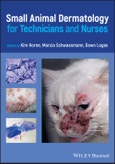Small Animal Dermatology for Technicians and Nurses is a practical manual specifically designed for veterinary technicians, nurses, and other staff members. This easy-to-read book covers common dermatologic diseases frequently seen in private practice, with information on history taking, sample collection, diagnostic testing, therapeutic options and patient follow up. Each disease described includes important background information to help technicians explain treatment plans and improve client compliance.
The book presents step-by-step instructions with illustrative, full-color photographs to aid in accurately collecting samples and performing in-house diagnostics. The authors have drawn on their real-world experience as practicing dermatologists and dermatology technicians to create a must-have guide for those working in the small animal veterinary field. This important resource:
• Provides practical information on veterinary dermatology tailored to veterinary technicians and nurses
• Offers details and tips on history taking, sample collection, diagnostic testing, and patient follow up
• Takes a practical, easy-to-follow approach with illustrative, full-color photographs that demonstrate techniques
• Supports veterinary staff by providing a solid foundation in dermatology that can improve communication with clients
• Includes all the information technicians need to support their veterinarians in managing dermatology cases with confidence
Written for veterinary technicians, nurses, and veterinary technology and nursing students, Small Animal Dermatology for Technicians and Nurses offers an indispensable reference for any veterinary team member assisting with common small animal dermatology cases.
Table of Contents
List of Contributors xiii
Preface xv
Acknowledgments xvii
Introduction xix
Section I The Role of the Veterinary Technician and Nurse 1
1 Managing the Small Animal Dermatology Patient 3
Kim Horne
Introduction 3
History 3
Dermatological Procedures 6
Flea Combing 6
Ear Cytology/Swab 9
Skin Cytology 11
Tape Prep (Especially Useful for Finding Yeast on the Skin) 12
Sampling a Pustule 14
Sampling a Crust 14
Skin Scraping 14
Sarcoptes scabiei and Notoedres cati (Feline Scabies) 15
Demodex canis, Demodex cati, Demodex injai 16
Cheyletiella spp., Demodex cornei, Demodex gatoi, Lynxacarus radovsky, Lice (Linognathus setosus, Trichodectes canis, Felicola subrostratus, etc.) 17
Fecal Flotation 17
Trichography 17
Dermatophyte Culture 19
Mackenzie Brush Technique 20
Tape Prep Procedure 20
Skin Punch Biopsy 21
Client Education and Client Compliance 23
Helpful Hints to Improve Client Compliance 24
Capsules and Tablets 24
Injections 24
Bathing 25
Ear Cleaning 25
Handouts 25
Recheck Appointment Options 25
Phone Calls 26
Conclusion 26
References 26
Section II Skin and Ear Diseases 27
2 Bacterial Infections 29
Dawn Logas and Christie Yamazaki Delan
Introduction 29
Pathogenesis 29
Surface Pyodermas 29
Clinical Features 30
Diagnostic Tests 31
Treatment 31
Superficial Pyodermas 32
Clinical Features 32
Diagnostic Tests 34
Treatment 35
Deep Pyodermas 35
Clinical Features 35
Diagnostic Tests 38
Treatment 39
Client Education 40
Feline Bacterial Skin Infections 41
Methicillin‐Resistant Staphylococcal Infections 42
Conclusion 43
References 43
Recommended Reading 44
3 Malassezia Dermatitis 45
Barbara Haimbach
Introduction 45
Clinical Features (Canine) 45
Clinical Features (Feline) 47
Diagnostic Tests 48
Treatment 49
Client Education 50
Conclusion 51
References 51
4 Otitis Externa 53
Dawn Logas
Introduction 53
Pathogenesis 53
Clinical Features 57
Diagnostic Tests 58
Treatment 59
Predisposing Factors 59
Primary Causes 60
Perpetuating Factors 60
Ear Cleaning 60
Client Education 63
Conclusion 64
References 64
5 Dermatophytosis 65
Sandra Grable
Introduction 65
Pathogenesis 65
Clinical Features 66
Diagnostic Tests 68
Woods Lamp Examination 68
Trichography 69
Fungal Culture 69
Fungal Culture Media and Systems 71
Gross Analysis and Microscopy 71
Common Contaminants 75
Safety Precautions 76
Biopsy/Histopathology 77
Polymerase Chain Reaction Test 77
Treatment 77
Topical Therapy 78
Systemic Antifungals 79
Environment 80
Client Education 80
Conclusion 81
References 84
Recommended Reading 84
Recommended Fungal Identification References 84
Section III Allergic Skin Diseases 85
6 Flea Allergy Dermatitis 87
Missy Streicher
Introduction 87
Clinical Features 89
Diagnostic Tests 91
Treatment 92
Client Education 95
Conclusion 100
References 100
Webliography 101
7 Atopic Dermatitis 103
Amanda Friedeck
Introduction 103
Pathogenesis 103
Clinical Features (Canine) 104
Clinical Features (Feline) 107
Diagnostic Tests 108
Treatment 111
Client Education 116
Conclusion 117
References 117
8 Food Hypersensitivity 121
Shelley Shopsowitz
Introduction 121
Pathogenesis 121
Clinical Features 122
Diagnostic Tests 123
Choosing an Elimination Diet 124
Performing the Diet Trial 125
Dietary Challenge 125
Treatment 125
Client Education 125
Conclusion 128
References 128
Section IV Parasitic Skin Diseases 129
9 Sarcoptic Mange 131
Stephanie B. Duggan
Introduction 131
Pathogenesis 131
Clinical Features 132
Diagnostic Tests 133
Treatment 135
Client Education 137
Conclusion 138
References 138
10 Cheyletiellosis 139
Jennie Tait
Introduction 139
Pathogenesis 139
Clinical Features 139
Diagnostic Tests 142
Treatment 142
Client Education 145
Conclusion 145
References 145
11 Canine Demodicosis 147
Kim Horne
Introduction 147
Clinical Features 149
Diagnostic Tests 150
Treatment 152
Localized Demodicosis 152
Generalized Demodicosis 152
Amitraz 152
Macrocyclic Lactones 153
Isoxazolines 154
Adjunctive Therapy 155
Patient Monitoring 155
Client Education 156
Conclusion 156
References 156
Webliography 157
12 Feline Demodicosis 159
Kim Horne
Introduction 159
Follicular Demodicosis (D. cati) 159
Clinical Features 159
Diagnostic Tests 160
Treatment 160
Superficial/Surface Demodicosis (D. gatoi) 161
Clinical Features 161
Diagnostic Tests 162
Treatment 162
Client Education 162
Conclusion 163
References 163
Glossary of Terms 165
Index 171








